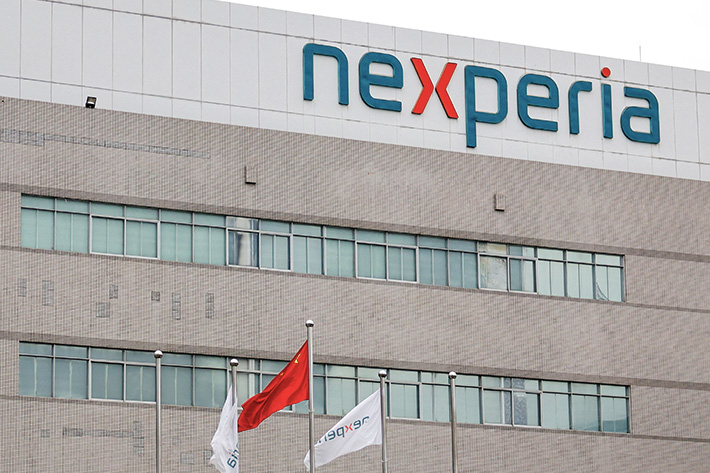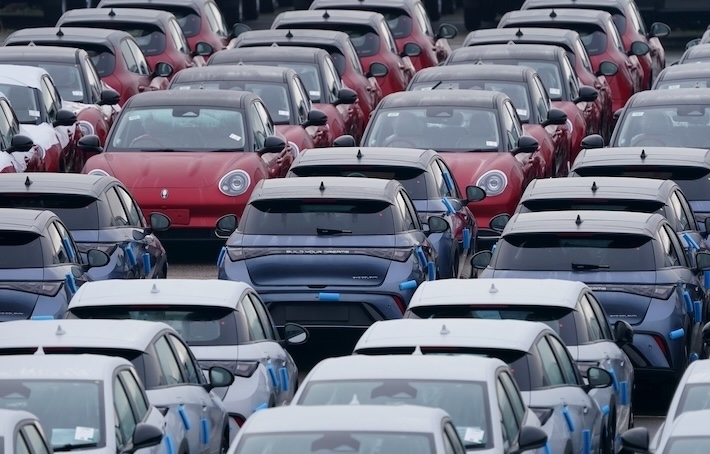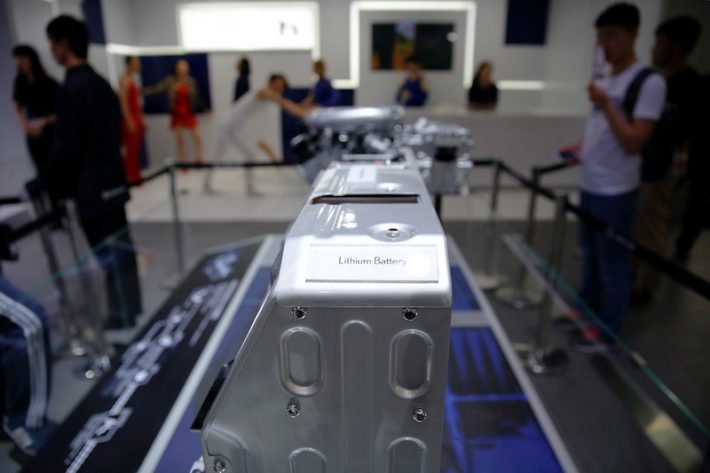Dutch chipmaker Nexperia and its Chinese parent — tensions between whom began when the Dutch government took over the company in September — descended into a dramatic war of words this week, while a shortage of chips continues to disrupt auto supply chains.
Headquartered in the Netherlands but owned by China’s Wingtech, Nexperia makes billions of simple but ubiquitous chips for cars and other electronics.
It manufactures most of its wafers in Hamburg, Germany, and then sends them to Dongguan, China to be packaged and sent on to customers.
Also on AF: Nvidia’s Biggest Chinese Buyer Can No Longer Use Its Chips For AI
The company’s operations were upended when Beijing halted exports of its finished products last month in response to the takeover of the chipmaker by the Netherlands government.
Separately, Nexperia’s Chinese arm declared itself no longer subject to control by European management after the seizure and on October 26, the European side of the company stopped shipping wafers to it, citing non-payment.
Over recent weeks, Beijing has partly relaxed its export clampdown. And last week, the Dutch government also suspended its takeover of the chipmaker, saying it was making a “goodwill” gesture in response to “positive” talks with China.
That sparked some hope of more normalcy in supply chains, but that remains uncertain after further events of this week.
On Thursday, Nexperia’s Dutch unit said in an open letter that it had made repeated and multiple attempts to restore dialogue, but had failed to get a response from its Chinese units. In its letter, it urged the Chinese units to help restore normal production.
‘No meaningful response’
“Nexperia BV has made repeated and multiple attempts, both formal and informal, to re-establish the dialogue with Nexperia’s entities in China by means of direct outreach via calls, emails and proposed meetings,” Nexperia’s open letter stated.
“Regrettably, Nexperia did not receive any meaningful response,” it added. The company called on its Chinese parent to restore the supply chain as “customers across industries are still reporting imminent production stoppages.”
It also called on Wingtech to restore direct communication with the chip unit.
“To avoid us having to communicate via public statements and via our customers, we re-emphasise our willingness to engage in direct dialogue with you via email or through a neutral, professional third-party mediator to ensure structured negotiations,” it said in the open letter.
“De-China-ized” supply chain
In response, on Friday, Wingtech accused the Dutch unit of conspiring to create a non-Chinese supply chain and permanently strip it of its control.
It said Nexperia’s Dutch unit was attempting to “evade responsibility” and “divert attention from real issues”, adding that “the origin and responsibility for the current disruption of the global semiconductor supply chain lie with the Dutch side.”
Wingtech added that supply chain disruptions would continue “if the control dispute remains unresolved.”
It went on to say that the continuing tensions were aimed to “buy time for Nexperia BV to construct a “de-China-ized” supply chain and permanently strip Wingtech of its shareholder rights.”
Auto supply chains at risk
Despite efforts to de-escalate tensions, ownership of Nexperia remains contested on the back of a ruling by an Amsterdam-based court which, soon after the Dutch takeover, stripped Wingtech of its control over the chipmaker.
Despite The Netherlands’ suspension of its seizure last week, the court ruling is still in effect, meaning Wingtech’s control over Nexperia has not been restored.
On Wednesday, China pushed for a company-led resolution following a call between China’s commerce minister Wang Wentao and EU trade commissioner Maros Sefcovic.
But caught in the middle of the continuing crisis are automakers who just a few years ago swore they wouldn’t be caught again by supply-chain disruptions.
Automakers vowed to strengthen supply lines after Covid-19 shutdowns triggered a chip shortage in 2020 and a fire at a factory owned by Japan’s Renesas worsened the crisis. But ongoing tensions around Nexperia exposed a blind spot: The industry never expected low-tech chips to become a lever for China against the West.
“No one prepared for geopolitical disruption, and they’re still not prepared,” Ambrose Conroy, CEO of US firm Seraph Consulting, which advises automakers told Reuters.
Nexperia manufactures most of its wafers in Hamburg, Germany, and then sends them to Dongguan, China to be packaged and sent on to customers.
Those chips — used in everything from car brakes to electric windows — sell for fractions of a penny each. Yet the shortage forced Nissan and Honda to cut production and drove German supplier Bosch to curtail factory working hours.
‘No way out’
While the Dutch government took control of the headquarters in Nijmegen, the operations in China remained under the control of Nexperia’s Chinese parent.
“The Dutch thought they had seized Nexperia, but they only took over an office building,” said Li Xing, a professor of international relations at the Guangdong Institute for International Strategies, a think tank.
“What this shows is that, even in mid- and low-end segments, they depend on China. If China wants to get a grip on you, it still can. You have no way out.”
Another supply speedbump involved how chips are integrated into vehicles. Nexperia semiconductors are widely used in components like power modules, which manage electricity, and are often soldered straight onto the components. That means they can’t just be swapped out for another chip, said Nori Chiou, investment director at White Oak Capital Partners.
Any new vehicle component needs to undergo testing that can add months to the process of securing alternative parts, Chiou said. Nexperia’s spokesperson said substitution can’t be completed “overnight” because parts that seem identical can perform differently in vehicles.
Nissan Chief Performance Officer Guillaume Cartier told Reuters that replacing vulnerable supply chains takes time.
“I know what everyone will tell me, ‘Ah, but you didn’t learn from the past,'” he told Reuters last month. “Yeah, OK. But do you believe you change all your supply in three years?”
The Nexperia shortage forced Nissan to cut production of its top-selling Rogue SUV, and poses a continuing risk for this year.
Meanwhile, preparing for chip choke points will not be easy, or cheap, Alfredo Montufar-Helu, a managing director at Ankura Consulting in Beijing told Reuters.
“Everyone is going to start talking once again about building resilience, about diversification,” he said. “And then they’re going to realise how expensive it is.”
- Vishakha Saxena, with Reuters
Also read:
Dutch Govt Suspends Nexperia Takeover After Talks With China
Dutch Take Control Of Chinese-Owned Chipmaker Fearing Tech Leaks
Chinese Spies Targeting Dutch Tech: Intelligence Agency
Dutch Minister Says China ‘Biggest Threat’ to Chip Tech Secrets
Chinese-Owned Nexperia Set to Take Over Dutch Chip Startup
ASML Employee Who Stole Chip Secrets ‘Went to Work at Huawei’
China Threatens to Cut Off ASML Over New US Chip Curbs
UK’s Largest Chip Plant Staff Want to Keep China Owners – BBC
























